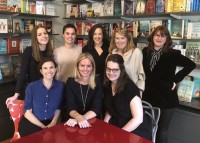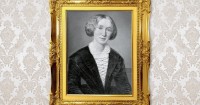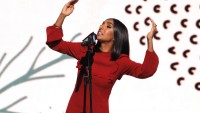
How Many Characters?
By G. Miki Hayden
Instructor at Writer's Digest University online and private writing coach
firstwriter.com – Monday December 30, 2019

I never really thought about how many characters might be best in a novel because my characters have always had real and necessary roles, and that’s what I’ve stuck by. But recently I had a student whose novel is off to the races with 10 different third-person point of view characters and about an equal number of secondary characters. The student was struggling with whether that was optimal or whether she needed to ditch the whole project. Hey, wait, never toss a project until you’ve pondered the various implications.

The 2010s were supposed to bring the ebook revolution. It never quite came.
vox.com – Monday December 23, 2019

At the beginning of the 2010s, the world seemed to be poised for an ebook revolution.
The Amazon Kindle, which was introduced in 2007, effectively mainstreamed ebooks. By 2010, it was clear that ebooks weren’t just a passing fad, but were here to stay. They appeared poised to disrupt the publishing industry on a fundamental level. Analysts confidently predicted that millennials would embrace ebooks with open arms and abandon print books, that ebook sales would keep rising to take up more and more market share, that the price of ebooks would continue to fall, and that publishing would be forever changed.
Instead, at the other end of the decade, ebook sales seem to have stabilized at around 20 percent of total book sales, with print sales making up the remaining 80 percent. “Five or 10 years ago,” says Andrew Albanese, a senior writer at trade magazine Publishers Weekly and the author of The Battle of $9.99, “you would have thought those numbers would have been reversed.”
And in part, Albanese tells Vox in a phone interview, that’s because the digital natives of Gen Z and the millennial generation have very little interest in buying ebooks. “They’re glued to their phones, they love social media, but when it comes to reading a book, they want John Green in print,” he says. The people who are actually buying ebooks? Mostly boomers. “Older readers are glued to their e-readers,” says Albanese. “They don’t have to go to the bookstore. They can make the font bigger. It’s convenient.”
Ebooks aren’t only selling less than everyone predicted they would at the beginning of the decade. They also cost more than everyone predicted they would — and consistently, they cost more than their print equivalents. On Amazon as I’m writing this, a copy of Sally Rooney’s Normal People costs $12.99 as an ebook, but only $11.48 as a hardcover. And increasingly, such disparities aren’t an exception. They’re the rule.
So what happened? How did the apparently inevitable ebook revolution fail to come to pass?

3 books to help you become a better writer in 2020
redlandsdailyfacts.com – Sunday December 15, 2019

The New Year will soon be upon us and as this is seen as a time of rebirth and rejuvenation, many people use the New Year to embark on a journey of self-improvement and self-reflection. Many people take this time to pick up a new hobby, create and maintain better habits, and maybe improve one’s lot in life.
One skill that I personally try to improve upon is writing. Writing is a necessary skill and a refresher course on writing is apt to keep those skills sharp. It’s also helpful so that in the middle of an important writing session, you don’t have to stop and look up whether it’s light bulb or light-bulb (lightbulb), or where to put the apostrophe in the plural of Adams ( … this one maybe look up).
Reading is one of the best ways to improve your writing, and reading a book about improving writing should improve things even more so. Like three fold. (This is about improving writing, not math skills. That’s for next time.)

Born of Friendship, the Book Group Is Making Its Mark as an Agency
publishersweekly.com – Saturday December 14, 2019

Walking into the offices of the Book Group, housed in a small (by Manhattan standards) building on West 20th Street, one is greeted by the standard design trappings of literary agencies. Posters of book jackets line the walls and dozens upon dozens of books sit on shelves hanging above desks in cubicles and offices.
In the conference room, where the books of clients sit spine out on shelves that stretch from hip level to the ceiling, the vibe is unusually positive. Those who work in publishing can tend toward glass-half-empty. The eight women who work at Book Group (four principals, one senior agent, one agent, and two assistants) seem different. It feels a bit like stepping onto the set of a TV show about book publishing—one cast by the creators of Friends, featuring characters written by Aaron Sorkin.

Point of View Quickly Brings a Story to Life
By G. Miki Hayden
Instructor at Writer's Digest University online and private writing coach
firstwriter.com – Wednesday December 4, 2019

Intimacy with characters will hook your readers
A close point of view, whether first person or third, will supply the inner meaning to a story. Such an intimate point of view brings to any piece of fiction insight, warmth, understandable human foibles, and an empathetic reader attraction to the character. This “limited” point of view facilitates a direct transmission of emotion. Without such a specific character perspective, all the readers have to enlighten them is outer description—although externals can, of course, go a long way to pointing to feeling and shoring up emotional declarations.

Why are great women writers still adopting male pseudonyms?
stylist.co.uk – Friday November 22, 2019

There are some interesting things you may or may not know about Nuneaton-born writer, George Eliot. In 2015, her landmark book, Middlemarch (1872), topped a BBC poll of the 100 greatest British novels and it’s been cited as one of the finest works ever written by such diverse writers as Virginia Woolf and Martin Amis.
But as well as her literary prowess, Eliot was also steeped in scandal. First she was ostracised by polite society for living openly with a married man, George Lewes. And then, after his death, her reputation took a further tumble when she married a man 20 years her junior only for him to attempt suicide on their honeymoon balcony in Venice.
To put it succinctly, the woman born Mary Ann or Marian Evans in 1819 is one of Britain’s greatest writers, having also written the stone-cold classics Adam Bede (1859), The Mill On The Floss (1860) and Silas Marner (1861) to name just a few. Yet Eliot remains something of an enigma.
In part, it’s thanks to her image as a slightly dour Victorian writer (her novels fell out of favour in the early 20th century only to be reappraised in the 1950s), but also, and more importantly, because of her male pen name. But just why did she feel the need to write under this false identity?

How do you write a novel? A draft in time saves nine
irishtimes.com – Thursday November 14, 2019

I’m often asked about the best way to write a novel’s first draft, and thank God for that, for otherwise I’d have no social life at all.
For some reason it generally seems to happen when I discover myself at the bottom of Dawson Street around lunchtime, waiting to cross over to the Trinity side.
“I say, Mr Burke!” bawls some aspiring scribe who, having recently perambulated around from College Green, has mistaken me for that prime hunk of literary boulevardier, Edmund Burke. “How does one go about writing a novel-length story?”
“Well,” I bawl back, which usually precipitates something of a conversational longueur, it being my accoster’s expectation that I have deployed same as a precursor to embarking on lengthy disquisition, whereas my advice in the matter of writing novel-length stories is as brief as it is simple, ie, that if they must be written at all, then they really ought to be written well.

When rejection isn’t failure
dailyprincetonian.com – Thursday November 7, 2019

This year, I had only one New Year’s resolution: to receive a rejection letter from a literary agent. This wasn’t because I didn’t want to succeed. It was because rejection isn’t the opposite of success, but a necessary step on the road to accomplishment.
Rejection sucks. It’s inevitable, but still — it sucks. This problem is especially prevalent here at Princeton, where students who were their high school’s star athlete or lead actor or first chair find themselves suddenly surrounded by people who are, let’s face it, more talented than them. So often, Princeton students will go through audition after interview after application and face rejection after rejection after rejection. I’ve certainly had my fair share here, and I won’t pretend that it didn’t shatter my self-esteem a little.

Agents Do Drop You
By G. Miki Hayden
Instructor at Writer's Digest University online and private writing coach
firstwriter.com – Monday November 4, 2019

When they stop communicating with you, you know you’re toast.
So should you negotiate without an agent?
Writers are often eager to have time-limited contracts with their agents—as well they might be (you want to get out when you’re ready to go)—but some agents have time-limited contracts for their own protection. One popular authors’ representative gives a contract for a six-month period and says if he can’t sell your book within that time, you’re free to go.

Thought poetry was dead? The 'Instapoets' raking it in online would beg to differ
theage.com.au – Saturday November 2, 2019

Paterson, Poe, Plath – would they have resisted plugging their work on Instagram? Meet the Millennials sending their pop verse viral – and generating sales that prove poetry’s demise has been exaggerated.
Standing on a Persian carpet before a crowd in Bankstown in Sydney’s west, swaying to the rhythm of her own words, Canadian performance poet Rupi Kaur recited Broken English. It’s a poem about the shame she once felt over her Sikh mother’s inability to speak the language. The 300 mainly immigrant Australian women at this, the Bankstown Poetry Slam, were mesmerised. Borrowing from the 1950s beatnik poetry tradition, the audience snapped their fingers in appreciation, then hollered and cheered as Kaur’s performance came to a close. “You can go on forever,” someone from the floor proclaimed, transfixed as much by the cadence of Kaur’s voice as by her verse.
It was May 2017, and the then 25-year-old Canadian dubbed the “queen of the Instapoets” and the “Oprah of her generation” was in town as a keynote speaker at the Sydney Writers’ Festival. Accompanying her on the visit was her publisher Kirsty Melville, whose American company is credited with a global revival of interest in poetry through the publication of books by young women like Kaur, now 27, who have both a way with words and a big social media presence. In Kaur’s case that means 3.8 million Instagram followers, who feast on a feed that alternates between selfies and sparse but digestible poetry.
Get the free newsletter | Submit a news item or article | Get Writers' News for your website





